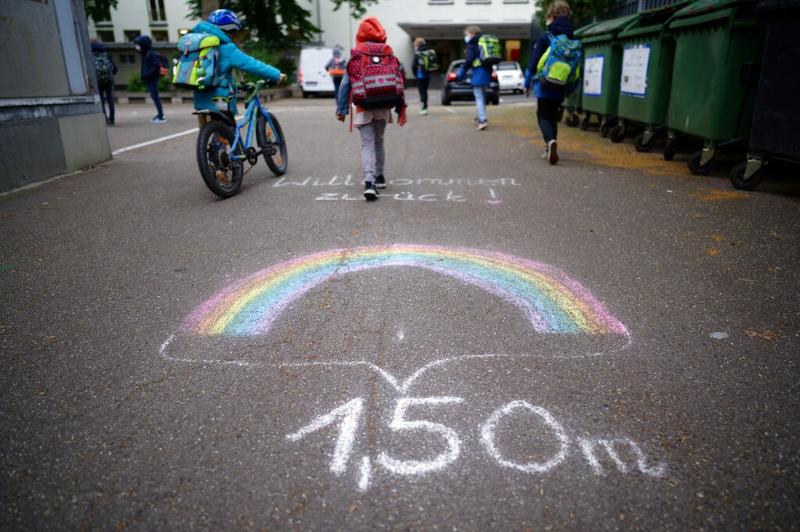 Street graffiti remind students to keep distance as they arrive at a primary school in Cologne, Germany, May 11, 2020. (HENNING KAISER / DPA VIA AP)
Street graffiti remind students to keep distance as they arrive at a primary school in Cologne, Germany, May 11, 2020. (HENNING KAISER / DPA VIA AP)
BERLIN - Chancellor Angela Merkel appealed to Germans on Monday to stick to social-distancing rules to slowdown the coronavirus pandemic after data suggested the disease was spreading faster again.
Germany is being closely watched worldwide as the most successful large European country in curbing the spread of the virus, partly thanks to massive testing, which has prompted a partial reopening of the economy. Merkel has frequently said the reproduction rate of the new coronavirus must be held below 1 to prevent the health system from being overwhelmed.
Merkel has frequently said the reproduction rate of the new coronavirus must be held below 1. But the Robert Koch Institute for public health said Monday the rate has hovered above this critical threshold for the third consecutive day
But the Robert Koch Institute (RKI) for public health said the rate hovered above this critical threshold for the third consecutive day with an estimated value of 1.07 on Monday, after 1.13 on Sunday.
The latest number indicates that 100 infected people on average infect 107 others, meaning the number of new infections is accelerating again which could signal the beginning of a second wave of the pandemic in Europe's largest economy.
"The increase in the reproduction number R makes it necessary to observe the development very closely over the coming days," RKI said in its daily report.
ALSO READ: Germany to ease lockdown as 1st phase of pandemic passes
German officials say the estimated reproduction rate or 'R' becomes more volatile as the overall number of infections declines, and a brief spike is not necessarily dangerous.
But Merkel, a physicist whose plain-spoken assessments have been held up as models of a scientific approach to the crisis, warned that it was crucial Germans stick to basic rules such as "keeping their distance, wearing mouth and nose protection and showing consideration for each other".
Confirmed coronavirus cases increased over the latest 24-hour period by a relatively small number of 357 to 169,575, data showed earlier on Monday. The reported death toll rose by 22 to 7,417.
Alarm at anti-lockdown protests
German politicians expressed alarm on Monday over anti-lockdown protests held in major cities at the weekend, warning that conspiracy theorists and others with an agenda were exploiting frustration with measures to contain the pandemic.
While protests held in Berlin, Munich and Stuttgart were relatively modest in size, several resulted in violent clashes with police as densely packed crowds violated social distancing requirements designed to prevent the virus from spreading.
The protests were mounted in part by proponents of conspiracy theories blaming everyone from vaccine makers to billionaire software tycoon and philanthropist Bill Gates for the disease.
German officials say the estimated reproduction rate becomes more volatile as the overall number of infections declines, and a brief spike is not necessarily dangerous
"Germany has a free media landscape that informs about all aspects of the pandemic," government spokesman Steffen Seibert said. "Abstruse claims and hate-filled assertions, theories about evils machinating globally are something quite different."
Germany has been successful in using social distancing to reduce transmissions of the virus. But the reproduction rate highlights the dilemma facing authorities as they chart a slow reopening of the economy and social life.
READ MORE: Merkel warns of virus-relapse risk as Germany eases curbs
"The idea that the pandemic was deliberately introduced to control the people, and that Bill Gates or other dark forces are behind it, reaches deep into the middle of society," Georg Maier, interior minister of the Thuringia region, told Der Spiegel magazine.
An employee of the Federal Interior Ministry was relieved of his duties at the weekend after writing and widely distributing an 80-page document on ministry notepaper in which he described the coronavirus as no worse than normal flu. The ministry described the paper as the civil servant's personal view.
Large gatherings such as the weekend protests risk becoming infection hot spots even as German authorities rush to prepare expanded medical facilities to deal with the possibility of new outbreaks or a broader second wave.
Berlin announced on Monday that an ad hoc hospital for coronavirus patients on the grounds of the capital's trade fair space had opened after four weeks of construction.
One of 50 such facilities being built around the country, it is designed to receive overflow patients in the event of a serious outbreak, leaving established hospital beds free for the most serious cases.


